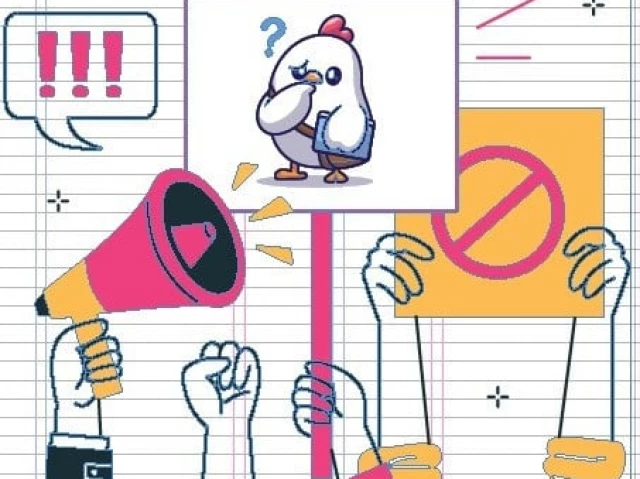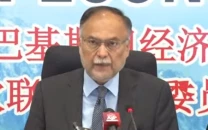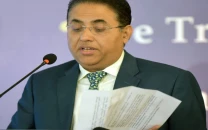IMF rejects wealth tax, chicken duty
Clears digital services tax worth Rs10b, middle income groups may get relief

The International Monetary Fund (IMF) has objected to the government's contentious proposals to impose a capital value tax on moveable assets and to slap a 5% federal excise duty on one-day-old chicks — measures that underscore the business-as-usual approach of the tax machinery.
While the IMF did not endorse the tax on moveable assets and one-day-old chicks, it did agree to the imposition of a tax on digital services aimed at raising Rs10 billion in revenue, according to sources in the Federal Board of Revenue (FBR).
There is also a budget proposal to increase the tax on dividend income of mutual funds from 15% to 20%. The withholding tax on interest income may also go up from 15% to 20%, according to officials of the FBR.
Among the proposals that may be announced on budget day is the withdrawal of income tax exemption for venture capital companies and funds, according to senior FBR officials. The income tax exemption for the cinema business may also be withdrawn.
There has so far been no relief in reducing the income tax rates for the highest slab of 35%, and the 10% surcharge on monthly incomes exceeding Rs500,000 may also remain, said FBR sources.
However, the IMF has agreed to reduce the income tax rates for the remaining four slabs, providing some relief on monthly incomes below Rs500,000. It has not agreed to increase the income tax exemption threshold to Rs1.2 million but has approved cutting the rate from 5% to 1%.
The sources said that the government wanted to reintroduce the wealth tax in the form of a capital value tax on all moveable assets, excluding shares of listed companies. The proposal had also been presented at the level of Prime Minister Shehbaz Sharif, said FBR officials.
The proposal to impose tax on moveable assets such as cash and gold was also shared with the IMF, said the officials. However, the IMF did not endorse the proposal on the grounds that the government should tax income instead of taxing wealth.
The FBR wanted to target cash balances in banks to raise revenue, according to FBR officials.
Through the Finance Act 2022, the government had introduced a 1% CVT on foreign assets worth over Rs100 million owned by resident Pakistanis, but it has been challenged in the courts.
The finance ministry and the FBR on Tuesday gave a briefing to PM Sharif about the budget contours, including measures that the IMF has cleared so far, the sources added. Some issues were still outstanding, including the relief for the real estate sector and the capital value tax.
President Asif Ali Zardari on Tuesday convened a National Assembly session for June 10, where Finance Minister Muhammad Aurangzeb will deliver his second budget speech. The Economic Survey of Pakistan is expected to be unveiled on June 9, the third day of Eid.
The FBR also wanted to introduce a 5% federal excise duty on one-day-old chicks, but the IMF did not support the idea. It pointed out that, on one hand, the FBR claims there are high taxes on food in Pakistan, and on the other hand, it recommends such proposals.
Proposals like the tax on one-day-old chicks and moveable assets indicate that the FBR has run out of ideas.
The IMF's concern was that taxing one-day-old chicks was not aimed at broadening the tax base; rather, it targeted a specific industry, said the sources.
The FBR did not conduct any study before proposing the tax on chicks, which are an essential food item. The measure was rooted in a tax case involving just one company among hundreds, revealing the shallowness of the proposal.
Last month, President Zardari issued the Tax Laws Amendment Ordinance, 2025, and one of the reasons was a poultry sector company. The government inserted a new section, 175C, in the Income Tax Ordinance through ad hoc legislation.
The sources said that proposals to impose a 5% federal excise duty on all processed foods — including chips and biscuits — were also considered. Effectively, the 5% FED means the sales tax rate will increase to 23%, and after adding further tax and withholding taxes, the overall cost of taxation will jump to 29%.
The prime minister was not in favour of doubling the federal excise duty on fertiliser and raised the issue with the IMF at the highest level. However, during last month's talks, the IMF asked the government to fulfil its commitment to increase the tax, said the sources.
The sources said there was still a likelihood that the government may double the federal excise duty on fertiliser to 10% and introduce a 5% excise duty on pesticides in the budget.
The sources said the prime minister was told that the budget numbers had been locked with the IMF. The FBR's annual target is likely to be Rs14.130 trillion, and the non-tax revenue target is Rs4 trillion. This brings the total tax and non-tax revenue target to Rs17.1 trillion.
The federal government has been allowed to allocate Rs1.186 trillion in budget subsidies, including Rs1.036 trillion for the power sector.
For IMF programme purposes, the federal development budget may be Rs873 billion, while provincial budgets are estimated at Rs2.1 trillion — about Rs700 billion less than what the four provincial governments indicated in the Annual Plan Coordination Committee meeting.
The IMF has allowed all federal and provincial governments to spend Rs22 trillion on current expenditures. The total expenditures by all five governments for IMF programme purposes are estimated at Rs25 trillion for the fiscal year 2025-26.






















COMMENTS
Comments are moderated and generally will be posted if they are on-topic and not abusive.
For more information, please see our Comments FAQ